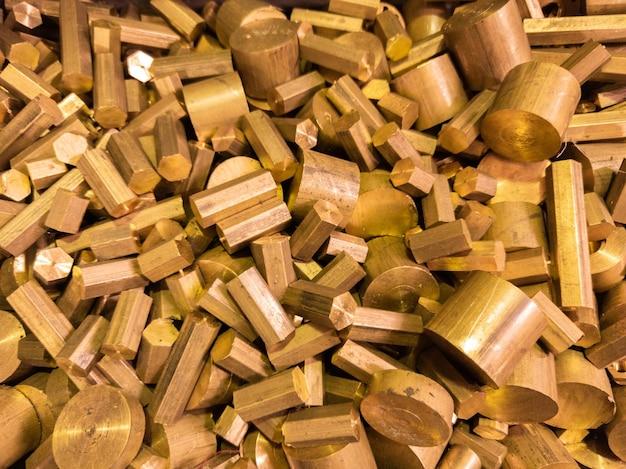Brass, a popular alloy made up of copper and zinc, is commonly used in various everyday items, from jewelry and cookware to plumbing fixtures. While its versatility and aesthetic appeal make it a sought-after material, questions about its safety have arisen. In this blog post, we will delve into the potential health implications of brass, answering crucial inquiries such as whether it is harmful to the skin, suitable for storing spices, or even safe for drinking water.
As of 2023, concerns regarding the impact of brass on human health have grown progressively, prompting individuals to question its safety. Many wonder if brass can cause adverse effects when it comes into contact with our bodies. Additionally, there are concerns about the presence of lead in brass fittings and the potential for poisoning. To shed light on these matters, let’s examine the different aspects of brass and its potential implications for our well-being.
Is Brass Harmful To Humans
Throughout history, brass has been a popular material for a wide range of applications, from musical instruments to plumbing fixtures. But is this versatile alloy harmful to our health? Let’s dive deeper into the world of brass and find out if we should be concerned about its impact on human well-being.
The Composition of Brass
Brass is primarily made up of copper and zinc, with varying proportions of these metals depending on the specific alloy. The addition of other elements, such as lead or tin, can also affect the composition of brass. This combination gives brass its unique properties, including its ability to resist corrosion and its attractive golden appearance.
Potential Health Risks
One of the main concerns surrounding brass is the presence of lead. In the past, lead was commonly used in brass alloys, but in recent years, regulations have limited its use due to its harmful effects on human health. However, it’s essential to note that modern brass products are typically lead-free or have very low lead content, making them safer for everyday use.
Contact Dermatitis: A Minor Inconvenience
While brass is generally considered safe, some individuals may experience contact dermatitis when their skin comes into direct contact with the alloy. This condition is characterized by redness, itching, and occasionally, the appearance of blisters. However, it’s important to remember that contact dermatitis is a common reaction to many different substances, and it affects people differently. So, don’t worry – brass is unlikely to turn you into a walking itch-fest!
Brass Ingestion: Not a Taste Sensation
Now, you might be thinking, “But what if I accidentally ingest brass?” Well, fear not, my friend! Even if you had a momentary lapse and decided to snack on some brass shavings (which I strongly advise against!), it’s highly unlikely to cause any serious harm. Brass is a non-toxic material, and while ingesting large amounts can potentially lead to gastrointestinal discomfort, it’s not something to lose sleep over. Save your taste buds for more delectable treats!
Precautions for Safety’s Sake
While brass is generally safe for human use, it’s still essential to take some precautions, especially when dealing with brass objects that have a high lead content or unknown origins. If you have concerns, here are a few simple measures to ensure your safety:
-
Wash Your Hands: After handling brass items, wash your hands thoroughly to minimize the risk of any potential contaminants ending up on your skin or being ingested.
-
Avoid Extended Contact: If you notice any signs of irritation or allergic reactions after prolonged contact with brass, consider using gloves or a barrier cream to protect your skin.
-
Use Common Sense: Avoid using brass items for food or drink consumption, as acidic substances and prolonged contact can potentially lead to the release of small amounts of metals. Opt for stainless steel or glass alternatives when it comes to culinary pursuits.
In the grand scheme of things, brass is generally a safe and reliable material for various applications. With its visually pleasing qualities and durability, it continues to be a popular choice throughout the world. While there may be minimal risks associated with brass, they are generally outweighed by the benefits it provides. So go ahead, embrace the beauty of brass, and let it add a touch of elegance to your life without unnecessary worry.
FAQ: Is Brass Harmful To Humans
Brass is a common metal alloy made from copper and zinc, and it has been used for centuries in various applications. However, there is some debate about its potential impact on human health. In this FAQ-style subsection, we’ll address some of the frequently asked questions regarding the safety of brass and its effects on the body.
Is Brass or Bronze Good for Health
While brass and bronze are popular choices for many applications, such as jewelry, cookware, and musical instruments, they are not considered to have direct health benefits. However, as long as they are used properly and not ingested, they generally pose minimal risk to human health.
How Dangerous is Brass
Brass is generally considered to be safe when used in the correct manner. However, prolonged exposure to high levels of brass dust or fumes may pose a health risk, particularly in industrial settings. It’s important to handle brass objects with care, especially if you work with them extensively.
Is Brass Bad for Your Skin
Brass is generally safe to wear as jewelry, but some individuals may experience skin discoloration or allergic reactions due to the presence of copper in the alloy. If you have sensitive skin or a known allergy to copper, it’s wise to opt for jewelry made from other materials.
Is Brass Good for Storing Spices
Brass containers can add a touch of elegance to your kitchen, but it’s important to note that prolonged contact between spices and brass could potentially lead to a metallic taste or even slight tarnishing of the metal. If you prefer to store your spices in airtight containers, it’s best to choose alternatives like glass or stainless steel.
Is Brass OK for Drinking Water
Brass fittings and faucets used in plumbing systems are generally safe for delivering drinking water. However, it’s advised to let the water run for a few seconds before using it for consumption, as this helps flush out any impurities that might have accumulated in the pipes.
Is Brass Toxic When Heated
Brass melting or heating can release toxic fumes containing zinc oxide, which can cause respiratory issues if inhaled in large quantities. Therefore, it’s crucial to handle brass in well-ventilated areas and adopt appropriate safety measures when working with high temperatures.
Can Brass Make You Sick
Brass itself is unlikely to make you sick unless you have a specific allergy or sensitivity to it. However, excessive ingestion of brass particles or prolonged exposure to high levels of brass dust or fumes may result in respiratory or gastrointestinal issues. It’s always wise to avoid ingesting or inhaling brass particles.
Do Brass Fittings Have Lead in Them
Some older brass fittings, particularly those manufactured before the reduction of lead content in plumbing components, may contain traces of lead. However, modern brass fittings are typically compliant with lead-free regulations, making them safe for use in plumbing systems.
Are There Different Grades of Brass
Yes, there are different grades of brass, each with varying compositions and properties suited for specific applications. The most common grades include standard yellow brass, red brass, and naval brass. It’s essential to choose the appropriate grade for your specific needs to ensure optimal performance.
Is Brass OK for Jewelry
Brass is a popular choice for jewelry due to its affordability and attractive appearance. However, it’s important to note that prolonged skin contact with brass can sometimes lead to discoloration or allergic reactions, especially for individuals with sensitive skin. If you experience any discomfort, it’s best to switch to jewelry made from hypoallergenic materials.
Can You Get Brass Poisoning
Brass poisoning is extremely rare, but it’s theoretically possible if large amounts of brass are ingested or if there is prolonged exposure to high concentrations of brass dust or fumes. However, for the average person, using brass objects in everyday life does not pose a significant risk of poisoning.
Which Is Better for Drinking Water: Copper or Brass
Both copper and brass can be suitable materials for drinking water applications. However, it’s essential to ensure that the components in contact with water are certified as safe for potable water. Modern brass fittings specifically designed for plumbing systems are typically lead-free and considered safe for drinking water.
What Does Brass Do to Your Body
When used responsibly and appropriately, brass generally does not have any adverse effects on the body. Prolonged exposure to excessive amounts of brass dust, fumes, or ingestion of brass particles may cause respiratory or gastrointestinal issues. However, in normal circumstances, the presence of brass in your environment should not pose a significant health risk.
Can You Get Lead Poisoning from Brass
As mentioned earlier, older brass fittings may contain traces of lead. However, modern brass fittings are typically manufactured to be lead-free and comply with regulations. Therefore, the risk of lead poisoning from brass, especially in everyday use scenarios, is minimal.
Are Brass Faucets Safe
Brass faucets manufactured according to modern safety standards are generally safe for use in homes. However, it’s important to ensure that the faucets meet regulatory requirements and are certified as lead-free. Regular maintenance and cleaning of faucets also contribute to their long-term safety.
Is Brass Good for Health
While brass does not provide direct health benefits, it is generally considered safe for use in various applications when handled properly. As with any material, it’s essential to exercise caution and avoid excessive exposure, ingestion, or inhalation of brass particles or fumes to maintain overall health and well-being.
Why Is Brass Dangerous
Brass itself is not inherently dangerous; however, improper handling or excessive exposure to brass dust or fumes can pose health risks. The danger lies in prolonged inhalation or ingestion of brass particles, which can lead to respiratory or gastrointestinal issues. It’s crucial to handle brass with care and take appropriate safety precautions when necessary.
Is It Bad to Wear Brass Jewelry
Wearing brass jewelry is generally safe for most people. However, some individuals with sensitive skin may experience discoloration or allergic reactions due to the presence of copper in the alloy. If you notice any adverse reactions, it’s advisable to switch to jewelry made from alternative materials.
Is Brass Safe for Food
While brass is typically safe for contact with food in terms of toxicity, it is not recommended for storing highly acidic or alkaline foods as they can react with the metal, resulting in a metallic taste or slight tarnishing. It’s better to opt for food-safe materials like stainless steel or glass for food storage purposes.
Can Brass Rust
Unlike iron, brass does not rust. However, it can develop a tarnish or patina over time, especially when exposed to moisture and air. This tarnish is a natural process and can be minimized through regular cleaning and maintenance. However, for outdoor applications, brass may require additional protective coatings to prevent corrosion.
As you can see, brass is a versatile material that can be used safely in many applications. By understanding the potential risks and taking appropriate precautions, you can enjoy the benefits of brass without compromising your health. If you have any further questions or concerns, it’s always best to consult with professionals or experts in the field. Stay informed and make informed choices when it comes to your well-being.

